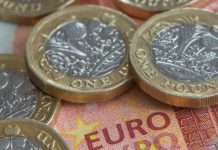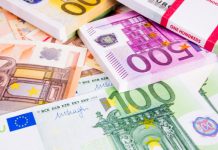- Pound (GBP) is rising after the PM paves the way for a tax hike
- BoE’s Bailey points to restrictive rates for longer
- Euro (EUR) falls after weaker German data
- Q2 GDP confirms a contraction
The Pound Euro (GBP/EUR) exchange rate is rising for a fifth straight day. The pair rose +0.14% in the previous session, settling on Monday at €1.1810 and trading in a range between €1.1796 and €1.1837. At 18:00 UTC, GBP/EUR trades +0.32% at €1.1853.
The pound is charging higher across the board, reaching a multi-year high against the US dollar and booking strong gains against the euro.
Comments have lifted the UK currency from Prime Minister Keir Starmer, who warned that the upcoming autumn budget could be painful. Comments from Keir Starmer pave the way for potential tax rises in the coming months, most likely from higher earners, in order to improve public finances.
Earlier in the month, chancellor of the Exchequer Rachel Reeves highlighted a £22 billion black hole that needs to be filled.
The pound is also supported by expectations that the Bank of England will keep interest rates on hold at the current 5% until the November meeting.
When Andrew Bailey spoke at the Jackson Hole symposium on Friday, he suggested that policy will need to remain restrictive for longer for inflation to hit the bank’s 2% target. The governor highlighted the difficulties of navigating the course in the wake of events such as the pandemic and the Ukraine war.
The euro is falling low after a slew of data from Germany. German GDP for the April to June quarter came in at -0.1%, confirming the contraction from the preliminary reading. The data comes after Ifo German business climate figures yesterday showed deterioration for a fourth straight month, highlighting the worsening economic outlook for the eurozone’s largest economy.
Meanwhile, today, GFK consumer confidence for Germany plunged in September as a weaker jobs market weighed on consumer sentiment. Consumer sentiment in September was 18.6, down fell from 18.6 in the prior month to -22. Delving deeper into the data, an increase in purchasing power felt by many households was not sufficient to compensate for rising concerns over the health of the labour market.
Signs of a weakening economy in Germany could encourage the ECB to cut interest rates again in September.





